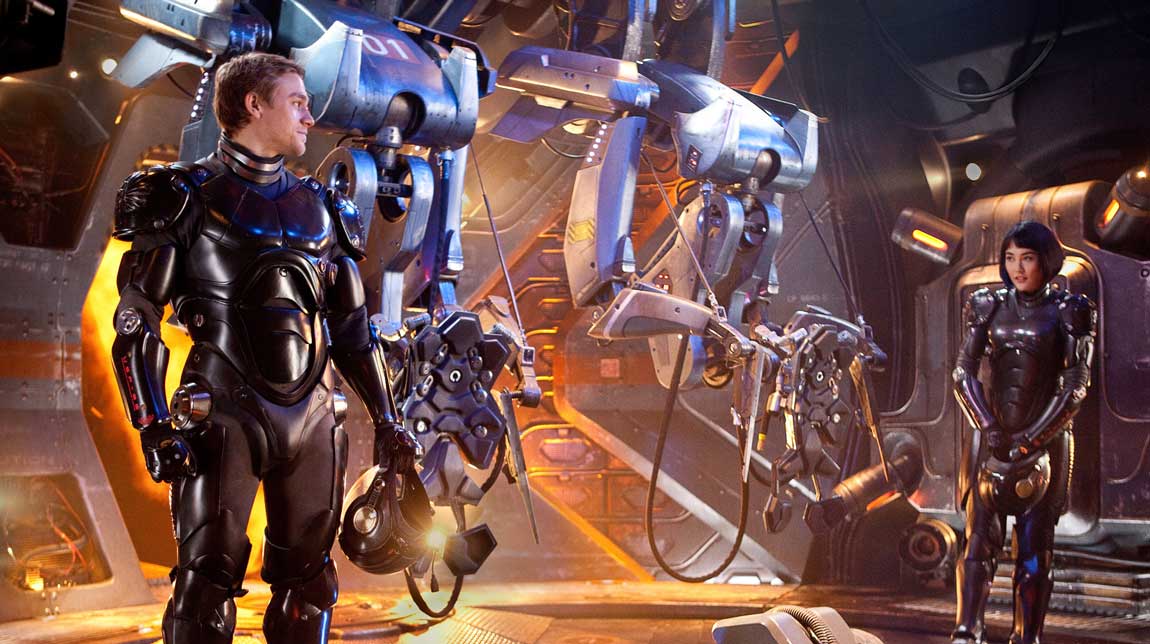Pacific Rim
A massive-scale battle royale between robots and monsters that doesn't fail to entertain.
Overview
Kaiju: Japanese word meaning, literally, 'strange creature'.
Jaeger: German word for "hunter".
Del Toro: Spanish for "of the bull"; a creative visionary and comic-book-loving movie director.
Pacific Rim is a big movie. Really big. Big across the board. As a blockbuster it had a budget of just under $200 million, and as an experience it's practically off the scale. It's one of those films where IMAX almost seems too small a screen. That's because Pacific Rim is, in simplest terms, a giant battle royale between robots (Jaegers) and monsters (Kaiju) that in size both easily dwarf earth's largest structures. To give an example, during one especially destructive rock 'em sock 'em session, a Jaeger uses something akin to the Exxon Valdez as a baseball bat.
Written and directed by by Guillermo del Toro, this is a film far closer to his Blade II and Hellboy days rather than his dark, art-house fantasy pieces like Pan's Labyrinth and The Devil's Backbone. Set in the 2020s, earth finds itself united against a common enemy: an alien race known as the Kaiju. Instead of coming from the skies, the Kaiju have opened a portal deep within an ocean trench and periodically emerge from within to lay waste to our cities.
In response, humans built the Jaegers: enormous weaponised robots standing 100m tall — an unwieldy juggernaut not unlike Iron Man, except, well, 100m tall. They're Robert Downey Jrs with some serious platform lifts and, just like the Iron Man, are piloted from Rangers within. The difference is that two (and sometimes three) pilots are required to handle the enormous strain placed on the brain, with each pilot responsible for one of the Jaeger's cerebral hemispheres. They're literally 'left brain/right brain' people and, to complicate things further, must 'meld' their minds so that they act as one. That's why the best teams are comprised of relatives: brother to brother, father to son.
Del Toro openly acknowledged that he wanted Pacific Rim to be more of a fun spectacle than the recent spate of dark and gritty blockbusters, but in this case that's an explanation not an excuse. Yes, it's more pop than penetrating, but unlike Transformers there's some substance behind the pop. Chiefly responsible for this is The Wire's Idris Elba, whose performance as the Jaegers' commander Stacker Pentecost imbues the film with a touch of class and a touching backstory.
The film's hero is played by Charlie Hunnam of Sons of Anarchy fame, and while he seems a little out of his depth as the lead, he's surrounded by a strong supporting cast that includes Ron Perlman, Charlie Day and Rinko Kikuchi — the latter bringing some much needed gender equality to end-of-the-world heroism roles. There are also two Australian pilots, played by British actor Robert Kazinsky and American Max Martini. Apparently in Hollywood, Aussie actors represent the Kaiju and everyone else has to band together to defeat them with accents so laughable even the Simpsons cast would wince.
Visually, Pacific Rim packs a massive punch and the design of both the Kaijus and Jaegers is spectacular. It does at times suffer from the Transformers 1 problem of frenetic action to the point of confusion, with the entangled scrappers merging into a singular incoherent mess of metal and skin. On the other hand, though, the direction of the action is far more consistent than Michael Bay's epileptic-fit-inducing approach, allowing you to at least track where the action's going even if you can't immediately see who's got the upper hand. And when the clarity does find its way into the battles, the experience is surprisingly exhilarating. Seeing a giant lizard get an upper-cut from a skyscraper-sized happy meal toy is far more satisfying than you'd think.
This is a big, fun (and pretty dumb) movie, but it's hard not to feel that the most compelling part of Pacific Rim is dispensed with during the film's prologue, detailing how, when the first Kaiju arrived, earth's conventional military might was exposed as blunt and ineffectual. Because of this, the entire film feels like the climactic final battle of a story that's yet to be told. It's perfect fodder for a prequel, but begs the question why Del Toro skipped the 'pre' and jumped straight to the quelling.





